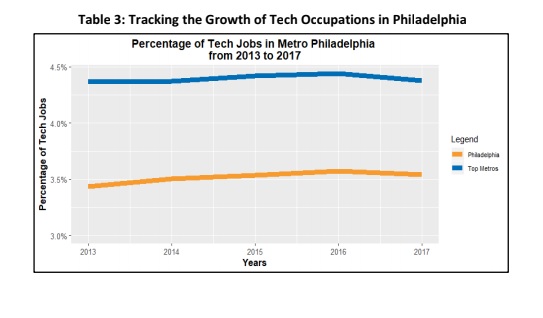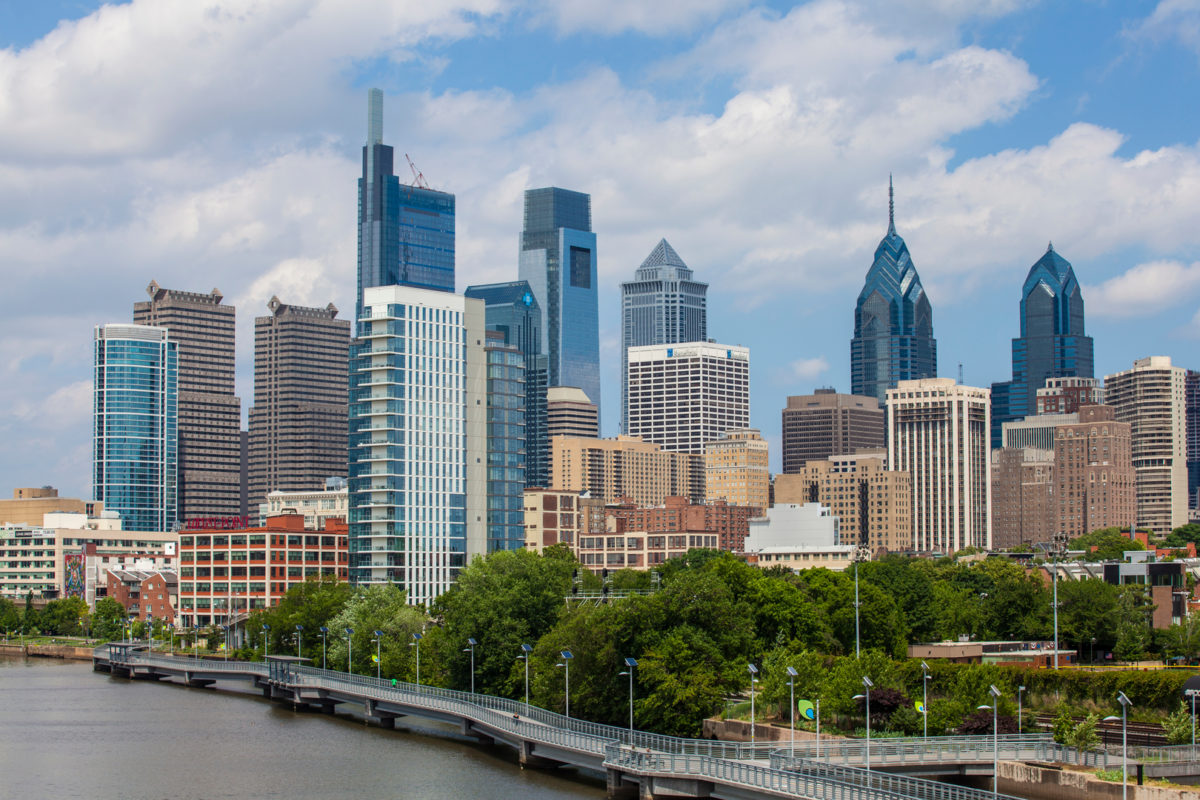When an operatic tenor, a Scrantonian and a social worker walk into a tech jobs fair in Philadelphia, it’s not because they like free company swag — they’re lured by the bustling tech industry, which since 2013 has expanded to include 8,060 new jobs in the Philly area.
Per a review of publicly available federal data amassed by the Economy League of Greater Philadelphia — an update to its 2016 report on the subject — tech occupations in the city account for 5 percent of the area’s net job growth since 2013. Tech jobs account for 3.5 percent of the region’s available jobs in 2017.
Nick Frontino, the think tank’s managing director, said the review of data depicts a tech market with around 100,000 people — 99,620 to be precise — who are employed at tech companies large and small. More and more verticals of industry, he said, are contributing jobs to that count: From retail to finance, most companies are now in need of technologists in their midst.
How does Philly stack up to other metro areas in terms of overall workforce? Well, the top three rungs among the country’s biggest metro areas are unsurprisingly claimed by Washington D.C., Seattle and San Francisco. Philly is in ninth place, slightly ticking above Los Angeles.
“Now, there are a couple factors to that,” Frontino said. “Overall job growth in the city has increased. In a sense, Philly’s a victim of its own success. Because we added more jobs on average every year, there hasn’t been much change between 2013 and 2016.”

“Over time, the trend looks similar,” Frontino said.”It’s pretty much flat, but rising a bit.”
The growth trend is in keeping with another report from consulting firm Robert Half Technology. At the end of 2018, it surveyed 100 Philly-based tech execs, 70 percent of whom said they planned to grow their tech teams throughout 2019, a whopping 90 percent saying that finding IT talent locally remained a challenge.
The upcoming Amazon campus coming to Northern Virginia, some local founders have told us, might also open the door for an uptick in tech talent coming to the Northeast Corridor, where Philly — with its three-punch combo of affordability, location and Gritty quality of life — could prove to be an attractive final destination.
The diversity challenge remains
From the 2017 report from the think tank to now, one challenge remains pervasive: Philly’s tech industry has a diversity problem, as revealed by the gender and racial makeup of its workforce.
About 71 percent of Philly tech employees are male. Only 3 percent are Hispanic or Latino; 70.4 percent are white, while just 8.8 percent of workers are Black, as estimated by the American Community Survey from the U.S. Census Bureau.
“The tech workforce, both here and nationwide, is not as diverse as it should be,” Frontino said, “especially in a city like ours, a majority-minority city. Ours is slightly more diverse than the nation, but nowhere near close to where it should be.”
Mike Shields, a project manager with the Economy League, said it was important to understand that any initiative to upend these inequities will take time: With a labor pool of 100,000-strong, we won’t see big percentage moves over time.
“Even if you’re able to diversify by 10 percent annually, you’re talking about 200 workers,” Shields. “It will take a bit of time for them to accumulate in the big numbers.”
(In order to quantify the diversity problem, a community survey on diversity and inclusion was launched last year by nonprofit Open Access Philly, with participation from Philly Startup Leaders, tech startup Guru, Mogulette and Media Bureau, Inc.)
How do we grow?
The overall strategies laid out in the think tank’s first report still ring true, both on growing the workforce and diversifying it. On the employers side, one proposal that has helped in other hubs is to increase their incumbent worker training.
“From a workforce development and hiring needs perspectives, there’s a disconnect,” Frontino said. “Up-skilling entry and mid-level employees can help employers find the top talent they need and also provides an avenue for entry-level folks to level up, and then open up those roles again.”
(Last year, the City’s Office of Workforce Development launched the Tech Industry Partnership, a curated group of 30 or so tech stakeholders tasked with helping to increase Philadelphians’ participation in the tech industry.)
Here’s a run down of recommendations from the think tank:
- Increase incumbent worker training and employer-led solutions
- Align and scale educational and tech training programs
- Raise awareness of tech career and training opportunities among underrepresented groups
- Improve access to data on tech talent in the region
Suburban beachheads
Anecdotally, Frontino expects the gateway office trend to continue: suburban companies setting up beachheads in the city in order to access the talent they need.
“As time passes you’re seeing a larger concentration of the talent companies need here in the city,” Frontino said. “With big news like Spark [Therapeutics] and Invisible Sentinel, you’re beginning to see more interest from tech-related firms looking to establish beachheads in Philly.”
The trend has two main drivers: the clustering of institutions and assets inside city limits and city lifestyle serving as amenities for potential new hires.
The main takeaway
Ask Frontino to describe the current state of our tech industry to a hypothetical out-of-towner and he’ll boil it down like this:
“It’s large, with about a 100,000 people in it,” Frontino said. “But in terms of relative concentration we have some catching up to do. We’re seeing growth and I’d expect more. With big anchors in the University City cluster and industries like biotech and new media, there is real reason for optimism.”







